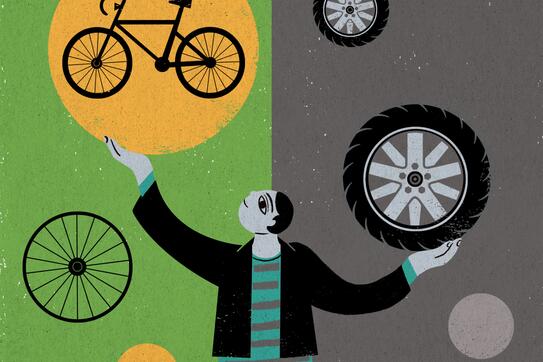The Sustainability And Behavior Laboratory is using effective strategies to tilt consumers toward pro-climate decisions.
If you ask people how concerned they are about global warming, research shows that their answer often depends on the weather that day.
If it's warmer than usual, people tend to report higher levels of concern, says Eric Johnson, the Norman Eig Chair of Business and director of the Center for Decision Sciences at Columbia Business School. “You believe what you feel, not the climate record of the last 30 years.”
Further studies have confirmed this phenomenon, termed the local warming effect, and found that people will act on their concern by donating to environmental causes. So, how do we persuade people to adopt climate-friendly habits without waiting for a blistering heat wave to convince them?
Johnson and a multidisciplinary group of experts in marketing, management, and consumer research at the School are deploying tools of choice architecture — the framing of choices in order to guide the outcome of a person's decisions — to test ways of guiding individuals toward environmentally protective actions.
Structuring Good Choices
Johnson, a psychologist by training, and colleagues from marketing, management, consumer research, and other fields founded the School's Sustainability And Behavior Laboratory (SABLab) in September 2021 with a startup grant from the Tamer Center for Social Enterprise. Its aim: to test how various techniques can help consumers make climate-friendly choices.
The team includes Vicki G. Morwitz, the Bruce Greenwald Professor of Business, and Gita Johar, the Meyer Feldberg Professor of Business, both experts in consumer psychology and behavior; Michael Morris, the Chavkin-Chang Professor of Leadership in the CBS Management Division, who also holds an appointment in Columbia's Department of Psychology; and several graduate students and postdoctoral fellows.
Leveraging their varied expertise in probing consumer choices, the new lab conducts behavioral experiments designed to reveal ways to help governments and businesses shape policies and product options to help people make socially beneficial choices.
The Research
Individual actions matter: Research shows that if an additional 10 percent of Americans make small changes, it will reduce US emissions exponentially — by nearly as much as the combined annual emissions from New York, Los Angeles, and Chicago.
Unfortunately, early research from the SABLab suggests many of us “really don't have a clue” about which actions actually make a difference, Johnson says. “Even if they are really well intentioned, people don't know what they should do to actually minimize emissions. They think of things like recycling as being more important than it is, when minimizing food waste and reducing the amount of meat that you eat is more effective.” The lab is therefore studying ways to highlight the most sustainable option through choice architecture — smart ways of designing the order, presentation, or description of options to subtly guide a decision-maker's choice.
Examples include:
- Defaults. Pre-selecting the socially or environmentally desirable option as the default choice can have surprisingly large effects. For example, researchers asked people to choose between green electricity and power from non-sustainable sources. By pre-checking the green energy box and requiring customers to explicitly opt out of that choice, researchers saw a 75 percentage point swing to the clean option — even though it would cost 10 percent more.
- Framing. People hate losing something they have more than they value something new they are given. Using this well-studied principle of loss aversion, the researchers worked with architects and engineers in a study structured specifically to influence behavior. Instead of awarding points for choosing, say, a higher -efficiency window, they subtracted points for low-quality choices. The number of windows picked with the highest insulation rating rose 27 percent.
Shaping Products and Policy
Beyond the lab, such behavioral science drives modern marketing and informs both businesses and governments.
Previously, Johnson worked with a German auto manufacturer to help it structure defaults that led buyers to select smaller, cleaner engines when ordering cars online. In September 2022, as an Einstein Visiting Fellow based at Technische Universität Berlin, Johnson helped develop approaches and tools that assist governmental branches and businesses in implementing measures to reduce individual or industrial carbon dioxide emissions.
Johnson offers more practical advice on creating effective choice architecture for businesses and policymakers in his 2021 book, The Elements of Choice: Why the Way We Decide Matters.
The new lab builds on this powerful and practical line of inquiry with a platform that harnesses collaborative energy across disciplines. “We're really talking across boundaries and learning from one another, but much of our group is in marketing or studies consumer behavior, so our focus is on shifting [consumers'] choices,” Johnson notes.
Individual consumer choices have less impact than corporate and governmental climate actions — but they add up. “And no matter what products our firms build or design, somebody has to buy them,” Johnson says. “So sustainability has to start with consumers.”
What Helps Cut Carbon? Test Your Knowledge
What helps cut carbon? How well do you know what is better for the environment?
Research from SABLab asks ordinary people what they think reduces greenhouse gasses.
For example: What reduces greenhouse gasses more? Taking one less flight a year or reducing your annual waste by 25 percent?
The answer may surprise you.
Find out and learn more about how to curb your emissions by taking our quiz.
